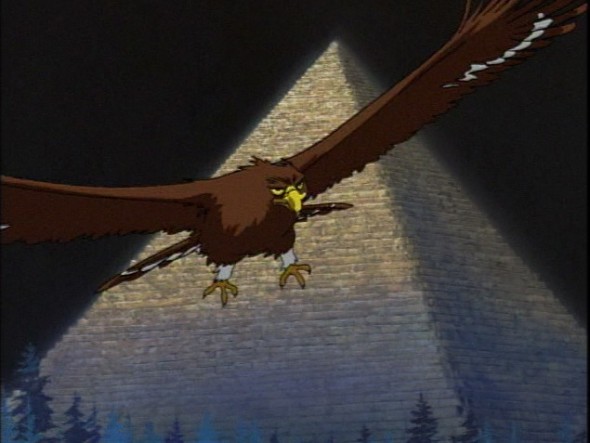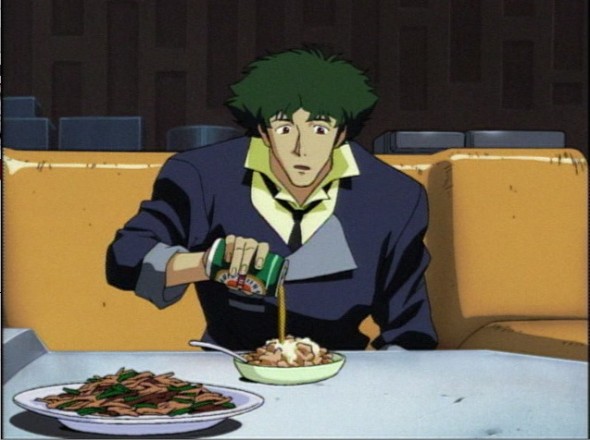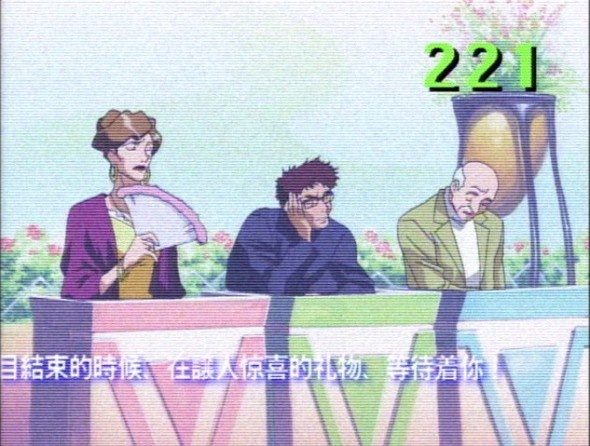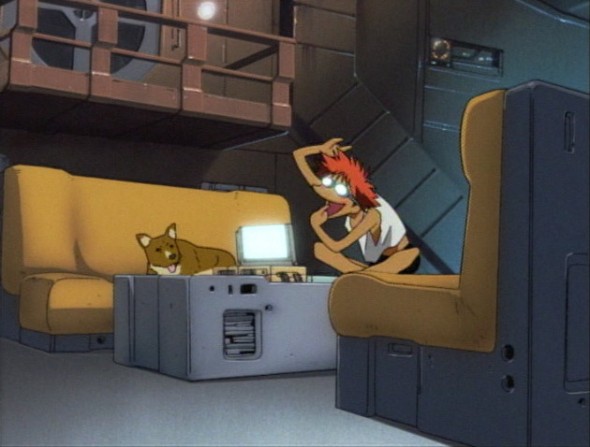
A still from Scratch's indoctrination video. Note the pyramid again -- and also that Londes is apparently Stephen Colbert.
If I pitched the story for Brain Scratch today, people would probably parse it as commentary on the internet. Or even more specifically, Facebook. It works for that pretty well – the idea of social isolates who only live in a cloud of electrons, the idea of video games stealing your life (hey there Farmville!), the ultimate punishment of being disconnected from all network communications… you wouldn’t have to rewrite it MUCH. But you’d probably have to remove the episode’s almost incessant references to the idea of television as such. Which I guess is a kind of longwinded way of saying that, yeah, Brain Scratch is deeply, deeply obsessed with television. It begins and ends with shots of TV screens, and is punctuated with more of these throughout. Londes’ lair consists entirely of giant piles of televisions. And when Londes has his confrontation with Spike, he gives a typical supervillain monologue on how terrible TV is — how it rots people’s minds, and makes them confuse their dreams with reality.
One wonders very much where the writers were going with this. Were they biting the hand that feeds them, as it were, and trying to convince their audience to turn off the TV and go outside? On the one hand, Londes is insane. Spike tells him as much before he starts blasting away. So we might see the character as a stand-in for the Tipper Gores of the world, and the episode as a flipping-of-bird to the same. On the other hand… Spike’s rebuttal isn’t particularly eloquent. And the Brain Dream WAS going to fry Jet’s mind like an omelette. And Spike’s big heroic effort in the confrontation DOES involve shooting up a whole bank of TV screens. And Londes DOES get the last word before the credits. There’s also some other business in the episode about how the images that we consume can begin to shape our behavior, like this little gag from the early going where Spike watches Ed do this —
and responds by doing this —
which does not end well for anyone, as you can probably guess. Actually there’s another moment from the opening montage that’s pretty critical to the viewing experience, although I couldn’t figure out an elegant way to work it in earlier on, which is that Spike and Jet first learn that Faye has joined the Scratch cult by seeing her interviewed on a TV documentary about the movement. Now, at the time, they have no reason to suspect that she’s doing this as an undercover operation. All they know is that they woke up one morning and she was gone. They presumably think that one of their closest friends has joined a death cult. But right before this, they were watching a talk show where an anonymous woman is sobbing frantically about her cult-member son, and the panel’s reaction is, well, this —
which is pretty much how Spike and Jet react to learning about Faye. I might be reading too much into this… I mean, neither one of them are much for emotional displays, especially where Faye is concerned. But it’s probably meant as a lesson about how the endless proliferation of media — shades of Teddy Bomber! — tends to result in a de-personalization of tragedy that can even dissociate us from the tragic events of our own lives.
So it’s a little hard to know whose side we’re supposed to be on. But when we consider Londes’ disintegration, combined with the opening and closing montages… well, I think it probably indicates that it’s a mistake to accept the narratives that are presented to us by electronic media as discrete and self consistent messages. They are, after all, just collections of glowing dots. We have to be careful about granting them a status they don’t deserve. Maybe the moral of the story isn’t even meant to be coherent?
Another thing to consider, of course, is that TV in Cowboy Bebop is already pretty well established by Speak Like a Child as an allegory for things like memory and storytelling. THAT opens up a whole other can of worms that I’m almost hesitant to grapple with: What is the relationship of storytelling, religion, and celebrity? What is the relationship of memory, storytelling, and self-image? Some of this is even brought up specifically in the episode, although again they put it in Londes’ mouth. “God didn’t create man. Man created god! And now Television is the new religion!” And the obvious resonance between the Scratch movement and Scientology only throws this into harsher relief. (Londes, Ronny, L. Ron?) Retrospectively, after having watched through to the end of the series, I can say that Cowboy Bebop eventually alights on the following proposition: our lives are given meaning by the people we are close to. (Not an astonishingly original message, I suppose, but one that I tend to agree with.) Brain Scratch plays into this by giving lie to a couple of counterclaims, such as life gaining meaning through religion (false: the scratch cultists are deluded), life gaining meaning through accomplishment (false: Londes is fantastically successful by any standard, but his achievement is hollow and he’s a psychopath to boot), and life gaining meaning through pop culture. Because remember, ALL of those voices out there in the sea of electrons, ALL of them, not just the crazy religious cultists, are nothing more than glowing dots on a screen. And that applies to Cowboy Bebop too. They’re pretty explicit about that last one: remember, the last image of the whole episode is that extreme close-up on Londes’ pixelated (cathode rayated?) face. Hey, thanks for the warning, TV show! Maybe I’ll stop watching you now.
I kid, I kid. Why would I go and do a thing like that?
I’m not done with Brain Scratch yet, though. As an episode of Cowboy Bebop, I’d classify it as slightly middling. Still a joy to watch, but not one of the true greats. There is however one thing that it does better than almost all of the other episodes, which is: be science fiction. This will take some explicating, I suppose.





I am SO glad you have finally decided to stop trying to make each of these articles smaller and allow one post for one episode at a time.
I love this series (of posts as well as the show itself) and seeing it had been updated from my twitter feed earlier gave me at least a good 30 minute escape from my current insomnia and depression. Keep up the excellent work and I look forward AS HELL to the last few posts.
Question: Will you be wrapping up with the final episode itself? Or will there be another post going over the entire series itself, separate from the post for the finale?
Finally!
Man, these posts by Stokes are great.
I love them almost as much as the earlier Cowboy Bebop posts by the other Stokes.
I hope when we bring on new Stokes to write the next article, it’s just as good!
Doubtful. I have it on good authority that that guy’s kind of a hack.
All these paradoxes and differing answers seem to be completely ignoring the most selfish and relevant reason to ask the question in the first place: I’m alive and I want to remain alive. You talk about copying the data in a brain and destroying it as though the act of destroying the (assumed) brain won’t end its stream os consiousness. I’m sure there are people who will disagree on a personal level, but I care far far less about the information contained within my brain than I do about staying alive, and an overwhelming amount of evidence says I need THIS brain to continue to get blood, oxygen and electricity to continue to experience the sensation of existing.
If you copy my brain into a robot that will behave exactly like me I’d love to hang out with it, but I won’t see though his eyes or think his thoughts because I’m busy with my own. THAT is the reason a copy of me isn’t me, because I’m being me right now. Not even because I remember my life, but because I’m experiencing my sense of self.
Oh, I agree completely! The question though is whether there actually is a stream of consciousness, or just a bunch of discrete little consciousness-chunks that we interpret as a stream because the alternative is too horrifying by half.
I wouldn’t tend to take the “identity does not persist” argument TOO seriously, though. Even if it were true, would it get us anywhere? We’d all just keep experiencing our identities as persistent anyway, so it’s hard to see how it would even matter.
One of the other issues with this is _demonstrating_ it. As much as we can currently tell, individual, subjective consciousness is nonfalsifiable, which means, in a scientific heuristic, it doesn’t exist — or rather, the burden of proof is on the person asserting it exists, and there isn’t any proof.
Of course, we intuit that individual, subjective consciousness exists. We experience it. But quantum physics and relatively, among other things, have taught us that intuition, experience and casual personal observation are well-nigh useless in determining the nature of reality. The universe just plain doesn’t work the way human beings experience it to work. Our perception and experience are too limited.
The way I see it, this presents a choice – you can either take the scientific approach and develop your working theories for how existence works based on what you can falsify, declining to assert nonfalsifiable things (such as the existence of the conscious self), or you can come to terms with the limitations of the scientific heuristic (which, of course, gets you in trouble on the Internet sometimes).
There are other philosophical tools for exploring this, but contemporary philosophical exploration, as I understand it, is heavily tied up in scientific methods and heuristics, and professionals seem to be leaning toward them. For example, there has been a lot of publicity for experiments over the last few year that show that the brain makes a decision before a person can report consciously making it. I see this as pretty baldfaced question-begging (because there is a preceding mechanism, we can rule out a root cause without accounting for the preceding mechanism), but a lot of people (most notably some New York Times writers last year, I believe) see this as proof against free will.
So I’m skeptical that we will see progress in our lifetimes on the question of subjective consciousness, but I do see a lot of risk that people will rely too much on the scientific heuristic, come to the conclusion that subjective consciousness must not exist, and commit suicide by robot brain replacement and stuff like that.
This summer I read Brian Greene’s _Fabric of the Cosmos_, and in it he talks about quantum teleportation, which isn’t teleportation at all, but exact copying. He argues that, if something is an exact copy down to the fundamental qualities of its quantum particles, it is the same thing – that there can be no quality of individuality or identity other than this. I suspect this is because he has had to dedicate his brain so thoroughly to the scientific heuristic in order to proceed as a quantum physicist – that he must disbelieve nonfalsifiable things.
But my suspicions about the limitations of the heuristic means I would never step into one of those teleporters.
Sorry, “relativity,” not “relatively.”
I also apologize for all other typos.
On the flipside, for this argument to hold any water, then the limitations of the scientific heuristic have to be “around” something — that is, if they only extend so far, then we need to acknowledge the places where they do extend, and not mistake a limitation for a repudiation. It’s not all or nothing.
The way I see it, if you actually want to make a definitive claim about something that happens in the world, if you want something useful, thinking scientifically about it is often the best way to go, limited only by the human mind’s persnickety and ill-advised tendencies to listen more to other types of arguments, whether they are valid or not.
So, if you want to know where life comes from, ask a scientist. Even if they don’t have a perfect answer now (and they have a pretty good one), by applying a scientific heuristic, they will have a useful answer that will get better over time, and they have good mechanisms in place for eventually separating useful assertions from total bullshit.
But if you want to know why something exists, science isn’t going to be all that helpful, because normative assertions and intentions are nonfalsifiable – you can’t find experiments that would disprove most of them were they to turn out a certain way, and as long as there is no possible way to disprove something, it becomes much more difficult to separate meaningful, useful assertions from total bullshit with that kind of authority.
This doesn’t leave the human mind without tools for approaching such matters, but it has a lot of important implications.
“If you want to know why something exists, science isn’t going to be all that helpful…”
Yeah, that’s a good way of putting it. This is where people get confused about evolution a lot of the time, I think. You’ll come across statements like “Giraffes evolved long necks so that they could eat leaves on high branches.” This is not correct — at least not what scienctifically. Rather, science tells us that giraffes evolved longer necks for no damn reason, and as a result were able to eat the leaves on taller branches.
Actually scientists have observed that giraffes don’t even bother eating leaves from high branches. They use their necks for THIS: http://www.youtube.com/watch?v=00l5gHPPGXw
I got too wrapped up in my gripping fear of death to mention that I’m really really glad to have this series back. Keep it up!
So glad to see your Bebop postings again! I was beginning to think you’d given up on it. :)
I loved this, especially where you said “…all that persists are memories and the illusion of identity, not identity itself.
And once we’ve followed the chain of reasoning around that far, we realize with a shock that this is something Cowboy Bebop has been about all — the damn — time! ”
I wasn’t wild about this session when I first saw it. Watching it again, I was struck by what Spike said in that scene where he faced off against Londes on that pyramid of screens. Spike says “I’m sick of this act. What’s wrong? Come on out. An illusion isn’t enough for me.”
Then:
Spike: Just like a little kid.
Londes: What?
Spike: YOU are the one who can’t tell… fantasy from reality, Londes. If you want to dream. Dream alone.
I thought it was significant that Spike “I’m just watching a dream” Spiegel would say something like that. And I love the profile shot of him when he said it.
For some reason, I can’t shake the thought that the whole session was written as the means to have Spike say those things.
Huuuuuuuuuuuh. That’s an interesting idea. A question to ask, then, would be whether Spike is self-aware enough to apply that knowledge to his own situation?
Shades of Sympathy for the Devil, right? In that case Spike obviously doesn’t recognize the similarities between himself and the baddie of the week (or at least explicitly claims not to — one could argue that he’s not to be trusted). Is he just as oblivious and/or self-deceiving this time around? Or has he matured a little, meaning that he’s talking as much to himself as to Londes in that sequence?
great article!
I really liked how you connected this episode to the central traumas at the center of the three adult characters’ backstories and how they’ve “died” through simultaneous personal betrayal/extensive physical harm, lost their identities, and returned to bum around space aimlessly, something like the cultists who leave behind their personal possessions/bodies to inhabit cyberspace forever.
But to follow this parallel, this episode implies that such a compromised existence (which–the life of being a badass bounty hunter–gets presented visually as fun, free, and “cool”) is a mistake/delusion and that those who have entered it SHOULD wake up, the way Faye does at the end through the intervention of her family unit/crew.
The differences between the crew and the cultists of course are 1. the remnants of memories from their former lives which come back in the form of key phrases, talismanic belongings (Julia’s name, music box, fake eye, Jet’s watch, Faye’s videotape) which the show suggests should be faced and then left behind and 2. they’ve forged a few grudging connections in the afterlife, ie, when Faye wakes up from THIS coma, there is at least someone around, not the romantic figure who will sweep her off her feet and buy her pretty princess dresses (subverted thoroughly the first time around) but part of a crew that will begrudgingly rescue each other when it matters. I guess that’s the show’s best case scenario after you’ve had the misfortune to symbolically die–grudging, ambiguous, and subverbal connections with the people around you. If you try for anything else–to return to the past, to fix mistakes, etc, it will blow up in your face. I like how the show still forces you to enjoy yourself, not by diluting this underlying bleak thesis, but instead overloading it on the other end with sensory awesomeness, eg. gun versus sword fights, hot ladies, zero-G battles, cool music, superpowered corgis, etc. Of course this uncompromising combination of “bitter” and “sweet” helps make the show so compelling.
The “talismanic belongings” thing is a really interesting idea that had not occurred to me. It’s almost a gesture towards Cartesian dualism: you need to discard material objects in order to arrive at some kind of spiritual connection. There’s a sense in which totems like the music box, the video, Jet’s watch, and so on are actively preventing the protagonists from making real connections.
This actually makes me think back to the end of Inception. [Spoilers] When Cobb walks away from the top to go play with his kids, that could also be seen as a rejection of the material fetish-object in favor of a spiritual connection, right?
Just to point out it’s probably Jet’s arm/scar which is his talismanic belonging, rather than the watch which he managed to throw away at the end of Ganymede Elegy. Not sure what that says about him, though.
Overthinking about the “talismanic belongings” concept, I believe that they aren’t only objects (Which difficult any approach or relation with the world). Instead, I see them as little deaths, losses or grieves that allow transformation of identity as Theseus boat, and in that way, functionality in the reality they are, and giving a new essence (or if you want rejecting the idea of non-changing inmutable essence).
As the new wood would let Theseus boat float:
-Jet’s robotic arm saved his life from getting a head shot;
-Faye’s erased memory facilitated her innocence Lossing, a feature of her that we see in videotape and that is clearly incompatible with the society in 2071. If her debts where true, which we never fully known, her “new” identity is the best fit for facing hem. Imagine waking up in the past where it was common for people to kill animals in order to eat/survive, if you were self conscious about you not being capable of killing anything cause in your time that’s not common you would perish in some days. But knowing nothing about yourself let you act like “well I don’t know, maybe I was an assassin, I could kill a chicken”
I explained a lot of this point cause it’s the same situation with,
-Ed’s family origin, not knowing where she came from allows her to be a informatic genius in the trash-place that is the Earth on the show, like a flower in the mud. She don’t know who are her parents so she could be anything, and believing it allows her so. Remember when ask about Radical Ed and someone even says it’s an alien. And forcing things, not being imposed with a gender/identity characterization blows the stigma of terrestrial woman, being poor, marginalized and (duh) woman (it seems to be harder in the future too, for example the Gren session and Faye being the only girl as a dangerous thing)
-Ein’s suffering experimentation make a corgi valued in 2 woolongs (even less than a dead lobster in Ganimedes) into the universe’s best hacker so far.
And also being Ed and EIN the ones who suffered the most traumatic transformation allows them to be the ones who get off the bebop and search new adventures embracing the new and , as Ed said, following the stranger (a.k.a following the white rabbit? Idk)
And we reach the end with
-SPIKE, who is the only main character who don’t embrace his loss but also hides it. He never talks about having a robotic eye with no one except when he is going to die. He is never depicted using his eye as an advantage in piloting the swordfish, or firing a gun, or doing a badass kick. Actually, he defeat Pierrot because of his eye, but he never realizes this, and really doesn’t care. (Not as Jet being conscious of blocking with his arm). In the first chapter we are shown this: Asimov has the advantage of (YES) “red eye” and Spike tells him: “You trust too much your eyes” like if that wasn’t the way of fighting or even living. The final chapter, where we are confirmed of his condition, and his also red eye, we could think: “he’s gonna kick Vicious ass” but we don’t do it. Because he doesn’t use it as he didn’t use his “ability” to save Julia neither. I thinks THAT moment Julia is about to being shot is the first moment the camera shows us Spike’s perspective, we see through his eyes the shot but not a special maneuver or detection of the enemy. I don’t know but I suppose that having a robotic eye in 2071 should have some vision improvements. The perspective we see is of a normal eye but in a moment only makes a blink like something weird happened. Idk if Julia’s death make that or if he never was conscious about his ability, but I firmly believe he thought about his condition as a disability. And being focused in the past is what makes him the character confined to death cause is what the show wants to show. Move on! You are what you do from this moment! What you have been or what you could have been, is not. Choose, act and Be.
Spike says all the time: “What ever may be should be” but he gets the pessimistic view of this phrase and he never realizes that his bebop family and his new eye and everything are what it should be and that he should be joyful about it.
There are others characters who could be analyzed in this way (Doohan, Ed’s Dad, Rhint and Alisa, Pao and daughter, and maybe if you look close everyone) but I wanted to focus on the “main” characters.
Thanks for blogs like this and forgive my English as it isn’t my native language.